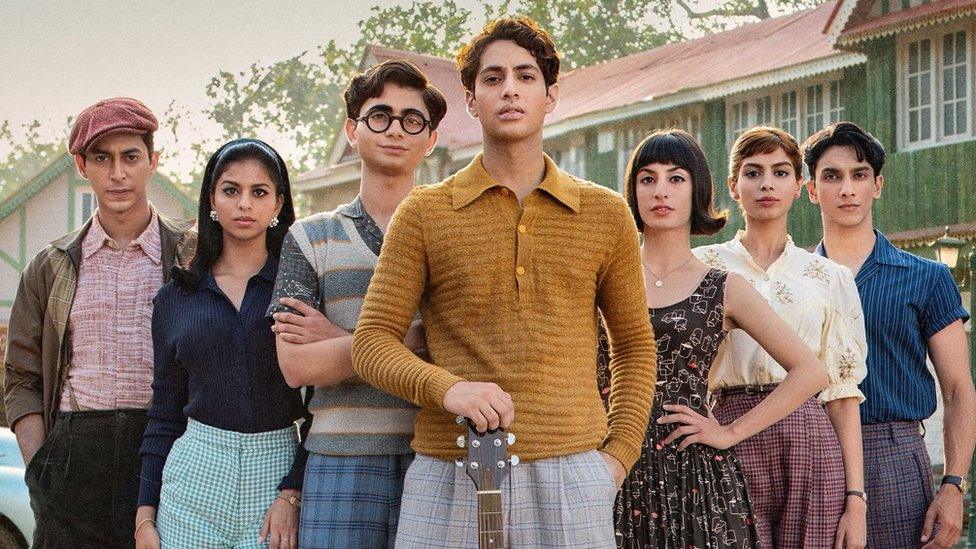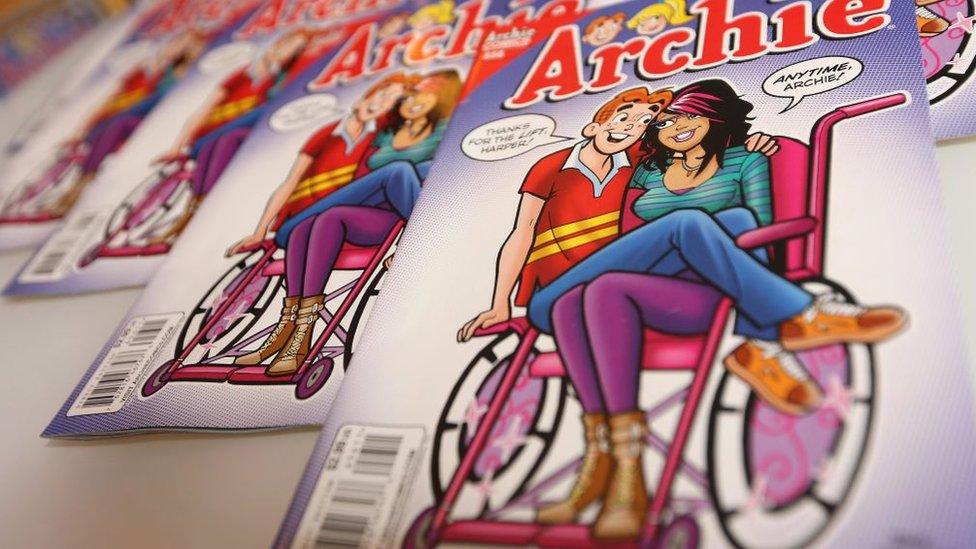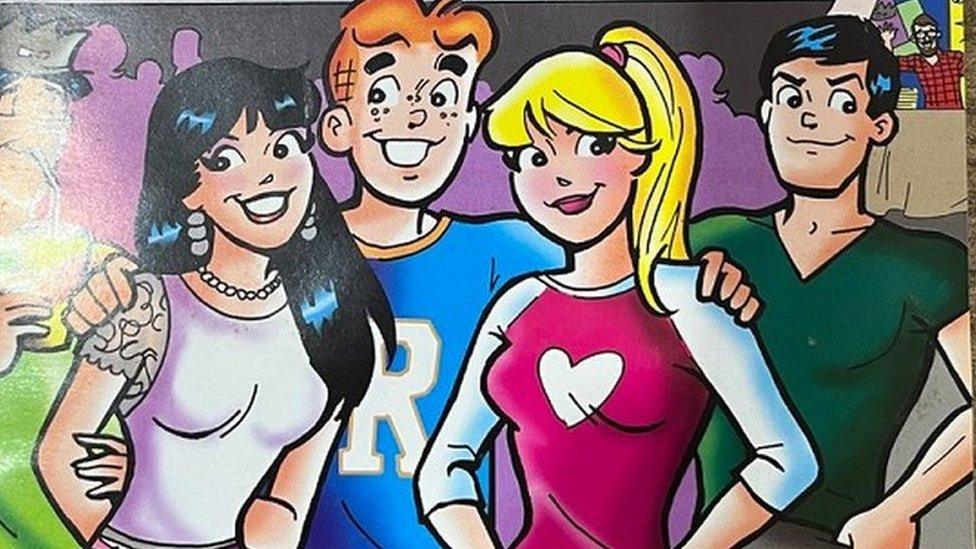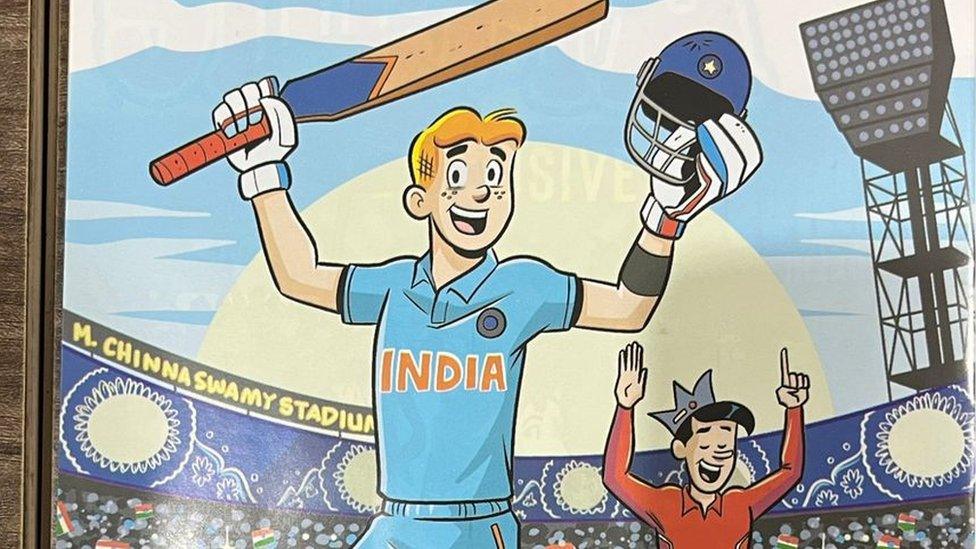The Archies: Why an American comic book evokes nostalgia in Indians
- Published

The Archies by Netflix is an adaptation of Archie Comics
"Yoohoo, Archiekins!"
If this catchphrase sounds familiar, you've probably read the long-established American comic, Archie Comics, which was also hugely popular in India.
The comic is back in the news, with Netflix set to launch The Archies, a musical adapted from the comic, later this year.
The coming-of-age film is based in 1960s India and explores teenage themes of love, heartbreak and rebellion through the lens of the Anglo-Indian community. The trailer has already been viewed over 800,000 times on YouTube.
The news of the film has sparked a lot of conversation among fans of the comic.
Some say the comic will benefit from having a more Indian context, while others have criticised the film for having characters that "don't look Indian". While the jury's still out on the film, there's no denying the influence Archie Comics once had over city-bred youngsters in India.
Archie Comics began circulating widely in Indian cities in the 1980s and 90s. That was the time when the young began watching Cartoon Network and MTV, listening to Backstreet Boys and plastering posters of the Spice Girls in their rooms.

Archie Comics has been trying to diversify its characters
"Archie Comics gave me my first taste of Americana. In fact, my idea of what American fast foods like hotdogs or burgers should look like came from there," says Mumbai-based Fiero Fernandes, an early fan.
Jatin Varma, founder of Comic Con India, agrees. "When it came to foreign comics, there was Tintin and Asterix, but it was Archies that really painted a picture of what life was supposed to be like for a youngster in America," he says.
"The storylines were carefree and clean. I guess that's why parents didn't mind their children reading these comics, even though it showed people going on dates or kissing or wearing bathing suits to the beach."
Archie Comics possibly arrived in India in the 1970s - fans would rent bound copies from lending libraries in Delhi. The comic could also be found at bookstores and roadside booksellers. But they were expensive and many children would trade copies with friends or ask family living abroad to mail old copies.
"The comic became social currency in school," Mr Fernandes recalls. "And discussing the plotlines or the characters was a common pastime."
The peppy vibe of the comic and its distinctive characters influenced many subsequent young-adult shows and films. Bollywood director Karan Johar reportedly admitted that his 1998 blockbuster film, Kuch Kuch Hota Hai, was partly inspired by Archie Comics.
The comic had simple plotlines - the main one being a love triangle between three of the lead characters.
Some plots discussed typical teenage issues, including limited pocket money, boredom, academic challenges, and the pursuit of romantic interests. A major draw was the titular character and his gang of friends.

The comics had quirky characters
Archie Andrews was a typical all-American kid - fluent in slang (he said things like "shucks" and "neat"), played football, fronted a band and had a bunch of hip friends. Despite being a "bumbling idiot" readers loved him because of his good heart.
Then there was Betty Cooper, the cute "girl-next-door" who was always competing for Archie's attention, and her arch-rival and friend, Veronica Lodge, who was a rich kid with a penchant for shopping and keeping Archie on his toes.
Jughead was a favourite because of his unfailing devotion to food. Then there was prankster rich boy, Reggie Mantle, who spent most of his time trying to one-up Archie in front of the girls.
All these characters - and more - lived in the fictional town of Riverdale, where nothing truly dark or disturbing ever happened.
"Archie comics constructed this image of what the typical American high school experience must be like," Mr Fernandes says. The students didn't wear uniforms, were part of cheerleading squads, drove to school in their own cars and enjoyed a rapport with teachers.
"None of this was happening for us, so the comics gave us a fantasy world to escape into and aspire to be part of," he says.

Archie Comics tied up with Comic Con India to launch India-themed comics
By the time the comic became popular in India, it had gone out of fashion in America. Comics were popular in US in the 1950s and 60s - in fact, Archie made his debut in December 1941 - but sales began dropping towards the end of the century.
Publishers have tried to reinvent Archie Comics by adding diverse characters, including the first gay character; exploring darker plotlines tied to current issues like gun control, body shaming, recession and even the challenges of sustaining long-term relationships like marriage.
The art has evolved - the highly stylised drawings of the 50s and 60s morphed into softer, more realistic cartoonish drawings in the 90s. In the 2000s, artists experimented with digital artwork to give the comic a more modern look.
Archie Comics have also come to the screen, including the 2017 American TV series Riverdale. The Archies is the latest adaptation.
But Indian fans appear to be torn over these new offerings.
Some like Reneysh Vittal say they miss the playfulness and simplicity of the older Archie Comics. "Our generation was lucky enough to experience life just before the internet took over and for me, Archie Comics will always represent that pre-internet age of innocence," he says.
However, Tejas Menon, who runs a pop-culture podcast and is also one of the singers in the new Archies film, says there will always be an audience for Archie.
"There's something about a coming-of-age story. It never fails to touch a chord because we've all experienced it," he says. "When told through iconic characters like Archie and his gang, there's bound to be some magic there."
BBC News India is now on YouTube. Click here, external to subscribe and watch our documentaries, explainers and features.

Read more India stories from the BBC:
